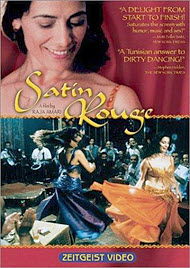Satin Rouge
Reviewed by: Carole McDonnell
CONTRIBUTOR
| Moral Rating: | Average |
| Moviemaking Quality: |
|
| Primary Audience: | Adults |
| Genre: | Foreign Music Drama |
| Length: | 1 hr. 40 min. |
| Year of Release: | 2002 |
| USA Release: |
| Featuring |
|---|
| Hiyam Abbas, Hend El Fahem, Maher Kamoun, Monia Hichri, Faouzia Badr, Nadra Lamloum, Abou Moez El Fazaa, Salah Miled |
| Director |
|
Raja Amari |
| Producer |
| Distributor |
In Raja Amari Satin Rouge, Lilia (Hiam Abbass) is a youngish widow with a grown ready-to-leave the roost daughter (Hend El Fahem). She spends her days cleaning the house and waiting for her daughter to come home. But lately, her daughter has been staying over at a “friend’s” house. This separation from her daughter is causing Lilia a case of empty-nest blues. Meanwhile, Lilia begins going to a cabaret—forbidden to women—and slowly becomes transformed by the life and the women she sees there.
Life is always hard for widows. But this is Tunisia where a widow not only has to contend with loneliness, the lack of intimacy and the lack of company. The country’s religion is Islam and certain behavior is expected. Lilia is a story about a woman whose vitality has been suppressed by her husband’s death, grief and by the role she is expected to play in life. She has lived her life for her daughter and husband and now what is she to do when he daughter doesn’t need her? What will her new role be?
The story gives us a good view of modern Tunisian life. For the most part, it is a nice sweet picture. The idea that one finds one’s freedom in sexual self-expression is an old one that occurs in many films. That may or may not be true. In this case, the self-expression is belly-dancing. Dance is shown to be a liberating artform that gets people in touch with their own attractiveness and joy. Lilia’s first encounter with the cabaret is such a powerful experience, she literally swoons from the vitality of the place. Personally, there are so many ways to be sexually attractive—gentleness, intelligence, holiness—but film makers tend to forget that. We live in a society where most young girls only develop the external in-your-face sexuality.
The story is a well-crafted and sweet story. A couple of sex scenes will be troublesome for Christian viewers. One other stumbling block is that a man (Maher Kamoun) makes love with a woman and later in the film with her daughter. The Old Testament forbids a man to have sexual relations with one person and then with another person who is closely-related, if all parties concerned are alive. I saw the film with a Moroccan friend who said such a thing would never be shown on Islamic television in an Islamic country. I told her that our Bible forbids it too (one of the reasons I couldn’t make myself see “America's Sweethearts”) but that American viewers are used to seeing all kind of things. The movie didn’t shock me, but it certainly shocked my Muslim friend.
This film won best new director award for its female director in the 2002 Seattle film festival. It supposedly pushes the Islamic feminist envelope. I suppose it did. As I said, my friend was shocked. A good therapy movie for widows.
In Arabic with English subtitles.


PLEASE share your observations and insights to be posted here.



